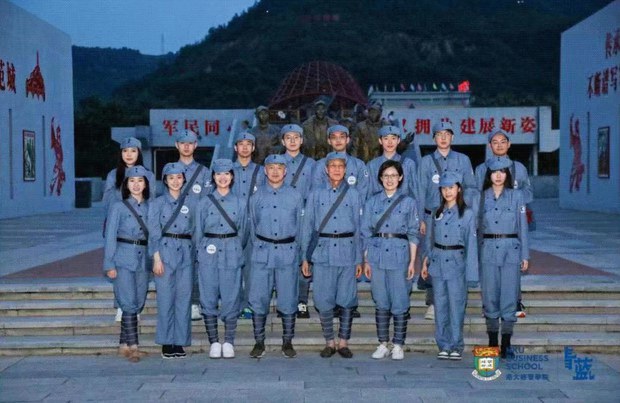Hong Kong students to go on more ‘red’ study trips to mainland China
Share

Photos of students from the University of Hong Kong dressed as revolutionary-era communist soldiers in the former Mao-era base at Yanan, China, were posted to social media platforms this summer.
Dressing up as revolutionary-era communist soldiers. Participating in military-style experiences. Visiting key spots where Mao Zedong consolidated his power during the 1934-35 “Long March.”
Hong Kong’s government is boosting a program of school trips to mainland China, adding iconic destinations linked to Communist Party history and boosting “revolutionary education.”
Meanwhile, the city’s universities are adding mandatory “national security” classes and sending students to absorb “red culture” at communist pilgrimage sites.
It’s all part of a concerted bid to change the mindset of Hong Kong’s young people, starting as young as kindergarten, to make them more amenable to authoritarian rule.
At its core is a program of Moral, Civic and National Education brought in to replace Liberal Studies in Hong Kong’s primary and secondary schools, which was blamed by Beijing for several waves of mass popular protest in the city since the 1997 handover to Chinese rule.
Authorities in Hong Kong have prosecuted hundreds of minors for taking part in the 2019 protest movement, with many already sent for “re-education” and military-style bootcamp training.
Secondary school students will now be able to take part in military-style experiences at a national defense education facility in the southern province of Guangdong, “cultivate patriotism and enhance national security awareness,” the Beijing-backed Wen Wei Po newspaper reported, citing a circular sent to schools by the Hong Kong Education Bureau.
Teachers in Hong Kong’s schools are also required from the start of this semester to report any “breach of laws and regulations or deviation from the moral standards generally acceptable to society” to the authorities.
The government has also stepped up “national security education” in universities, with mandatory classes and tests for students. Last month, photos of students from the University of Hong Kong dressed as revolutionary-era communist soldiers in the former Mao-era base at Yanan were posted to social media platforms last month.
‘Read thousands of books’
Last month, Communist Party leader Xi Jinping wrote back to a class of secondary school students in Hong Kong, calling on them to “read thousands of books and travel thousands of miles to gain an in-depth understanding of the history, culture and current situation of their motherland, to deepen their patriotic feelings and hone their schools,” Hong Kong education secretary Choi Yuk-lin said in a statement.
“In the new school year, the Education Bureau will build on the good experience of the past few months, strengthen collaboration … and further expand and deepen the effectiveness of mainland China study groups … so as to implement the spirit of the Chairman’s reply,” Choi said in a reference to Xi’s letter.
Last year’s school trip itinerary included a trip to Zunyi, where late supreme leader Mao Zedong consolidated his power at the head of the Chinese Communist Party and the Red Army in 1935, during the Long March.
Choi said in a statement on Aug. 28 that more than 43,000 Hong Kong secondary school students have taken part in mainland China school trips so far under the program.
“In the new academic year, inland study tours will include routes outside Guangdong Province and with a larger number of days,” she said. “In a trial mode, students will be arranged to visit comprehensive practical activity bases in Guangzhou and Shanghai in part of the itinerary to participate in experiential learning activities in conjunction with the Civics curriculum, further broadening the scope of students’ vision.”
One website offering study camps for primary and secondary school students in China is run by the Beijing-based company SmartCamp.
Schools can book camps that include the teaching of “traditional Chinese culture, education in the revolutionary tradition, and education about the national situation,” according to its website.
Visits to tourist attractions, waste-processing facilities, ecological parks and industrial sites are also included, it said.
Longer trips
According to the Wen Wei Po, the number of compulsory field trips to mainland China will be increased from the previous 22 to 26, with students traveling further afield on longer, 4 to 5-day trips, including to Shanghai, Chongqing, Fujian, Hunan and Guizhou.
Wong Ching-yung, head of Scientia Secondary School, told government broadcaster Radio Television Hong Kong that the one-day visits may soon get much longer.
“As we know, one-day tours are not that ideal. Even if you are going to the Greater Bay Area, transportation, meals, toilet breaks, getting on and off the car, and roll calls, actually took up most of the time,” he said.
“At this stage, one-day trips might be kept for another one or two years for schools that do not have much experience in holding mainland study tours to make the transition [to longer trips].”
Last month, “outstanding” University of Hong Kong students visited Yan’an, the “cradle” of the Chinese communist revolution, by invitation only, according to a report on their trip posted to the social media platform Weibo.
“After dinner, the students watched the first red-themed immersive play ‘Return to Yan’an,'” the report said. “In the new era, the younger generation feels close to red culture – many students couldn’t hide their tears when they watched it.”
“In that moment, everyone was deeply infected with the spirit of the Red Army,” it said.
The group went on to visit Zaoyuan, home to several former “proletarian revolutionaries” between 1943 and 1947.
“Every plant, every tree, every brick and every tile here carries the red gene,” the report said.
Translated with additional reporting by Luisetta Mudie.







